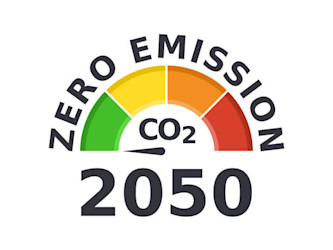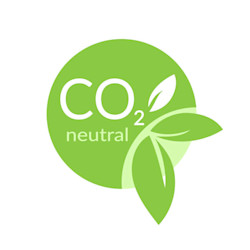What is a Hydrogen Boiler?
And when will you need one
Hydrogen boilers are not only highly efficient, but they can also help reduce the nation's carbon emissions. Read on to find out the advantages of hydrogen boilers and some of their potential drawbacks. Last updated - 11/11/2022
Estimated reading time - 5 minutes
What is a hydrogen boiler?
A hydrogen boiler is a highly efficient boiler that burns hydrogen to produce hot water for central heating systems and domestic hot water outlets. Currently, gas boilers are only capable of burning natural gas (methane) or a mixture of 80% natural gas and 20% hydrogen.
Hydrogen boilers look like the gas boilers we currently use, and they are also installed in a similar way. Just like natural gas boilers, they will also get their fuel from the mains gas supply.
Why all the talk about hydrogen boilers?
Government net zero targets

Burning fossil fuels such as gas and oil to heat our homes releases carbon dioxide into the atmosphere. Carbon emissions have a damaging effect on the environment and have a big impact on climate change. As a result, the UK government has committed to reducing carbon emissions to net zero by 2050.
Net zero means achieving a balance between the carbon emitted into the atmosphere and the carbon removed from it. Net zero will be achieved when the amount of carbon we add to the atmosphere is less than or equal to the amount removed.
According to the Committee on Climate Change, around 14% of the UK’s carbon emissions come from heating our homes, and as 85% of homes in the UK are connected to the gas network, decarbonising the way we heat our homes will go a long way in helping us reach net zero by 2050.
Gas boilers are to be phased out
To help lower the nation’s carbon emissions, the UK government has introduced legislation banning gas boiler installations in newly built properties from 2025. Properties built from 2025 onward will have to install a low-carbon heating system.
While there are other economical low-carbon heating options available, such as heat pumps biomass boilers, the initial cost of purchasing and installing these alternatives is quite high, and they also aren’t suitable for all homes. To help offset the initial cost of a heat pump or a biomass boiler, the government is offering grants of up to £6,000 through their Boiler Upgrade Scheme.
Instead of replacing most of the heating systems in the UK, using an alternative fuel in our current gas network would be less expensive and more practical. This is where hydrogen and a hydrogen boiler come in. Hydrogen is a gas that doesn’t produce any harmful greenhouse gases and can be supplied to our homes using the current gas network. Due to this, in 2028, the government will introduce a 20% hydrogen blend into the UK’s mains supply.
Nearly all gas appliances that are in use today are “hydrogen-ready”. A hydrogen-ready appliance is able to run on a mixture of hydrogen and natural gas, so you won’t need to do anything when the gas we use changes to a hydrogen blend.
The switch to 100% hydrogen is not expected to happen until at least 2040. When this happens, homeowners need to switch to a hydrogen-ready boiler.
Hydrogen-ready boilers are able to run on natural gas and can be converted to burn 100% hydrogen when the gas network makes the switch from natural gas to hydrogen.
Advantages of a hydrogen boiler
A hydrogen boiler produces zero carbon

Currently, the majority of UK households use gas-fired boilers for their hot water outlets and radiators. When fossil fuels such as gas or oil are burned, they release carbon dioxide into the atmosphere, which has a negative effect on the environment and contributes to climate change.
Burning hydrogen releases no carbon at all. The only by-product of burning hydrogen is water. Installing a hydrogen boiler will help reach the government's target of making the UK net zero by 2050.
Hydrogen is a very energy-efficient gas
1kg of hydrogen contains the same amount of energy as 2.8kg of natural gas. This means that a hydrogen boiler will use less fuel to provide the same amount of heat as a gas boiler. A reduction in fuel consumption could potentially lower heating costs and, as a result, lower home energy bills.
Hydrogen is plentiful in supply
One of the biggest advantages of using hydrogen as an energy source is how plentiful it is.
There are two main methods of producing hydrogen. The first method is electrolysis. This process involves splitting water molecules into two separate hydrogen molecules with a high voltage current. The second method is steam methane reforming, which ultimately converts water and methane into pure hydrogen.
Unlike fossil fuels that will eventually run out, hydrogen is a renewable energy source, which means there is no possibility of its supply running out.
The existing gas infrastructure can still be used
Hydrogen can be supplied to our homes using the same pipelines, fittings, and boilers as natural gas, so there won’t be a need to overhaul the current gas infrastructure. This makes using a hydrogen boiler a cheaper and more viable option than many other low-carbon heating solutions.
Disadvantages of a hydrogen boiler
Hydrogen production is expensive and can be carbon intensive
The two main methods of producing hydrogen, electrolysis and steam methane reforming (SMR) are expensive processes.
Electrolysis involves splitting water into oxygen and hydrogen using electricity, and SMR involves separating methane into carbon and hydrogen. Although these methods produce hydrogen, non-renewable sources such as coal, oil, and natural gases are used during the process. The purpose of switching to hydrogen is to stop using fossil fuels, but currently they are still needed to produce it.
Hydrogen is very flammable
Hydrogen releases more energy than natural gas when it is ignited. Although the gas our boilers currently use is potentially more dangerous, hydrogen is highly volatile and more flammable. This makes controlling the combustion of hydrogen during ignition more difficult than controlling the combustion of natural gas.
Hydrogen boiler manufacturers will therefore have to implement more safety mechanisms to reduce the risk of explosions. One such safety mechanism is an excess flow valve. Excess flow valves control the release of gas into a hydrogen boiler to prevent excess amounts of gas from entering the combustion chamber.
Can I buy a hydrogen boiler?
You can not buy a 100% hydrogen boiler yet, as the UK’s gas network does not currently supply pure hydrogen. However, the UK’s biggest boiler manufacturers, Worcester Bosch, Baxi, Ideal, and Vaillant, have developed 100% hydrogen boilers ready for mass production when the hydrogen gas infrastructure and regulations are in place.
Currently, most UK appliances are able to run on a hydrogen blend. A hydrogen blend is a mixture of 80% natural gas and 20% hydrogen. These appliances cannot run on 100% hydrogen and will need replacing when the gas network switches to hydrogen.
Although you may not be able to purchase a 100% hydrogen boiler yet, hydrogen-ready boilers are available.
How much will a hydrogen boiler cost?
Currently, 100% hydrogen boilers aren’t commercially available. However, when they are available to purchase, they will cost no more than an equivalent gas boiler. This is down to the price promise made by the UK’s four leading boiler manufacturers- Worcester Bosch, Vaillant, Ideal, and Baxi.
Currently, gas boiler prices range from £500 to £2,500 depending on the type (combi boiler, system boiler, or regular boiler), specification, manufacturer, and model. The price promise means that you can expect to pay roughly the same price for a hydrogen boiler when they become available.
The cost of installing a hydrogen boiler will likely be the same as that of a gas boiler installation due to how similar the components, accessories, heating controls, and installation process will be to those of a gas boiler.

